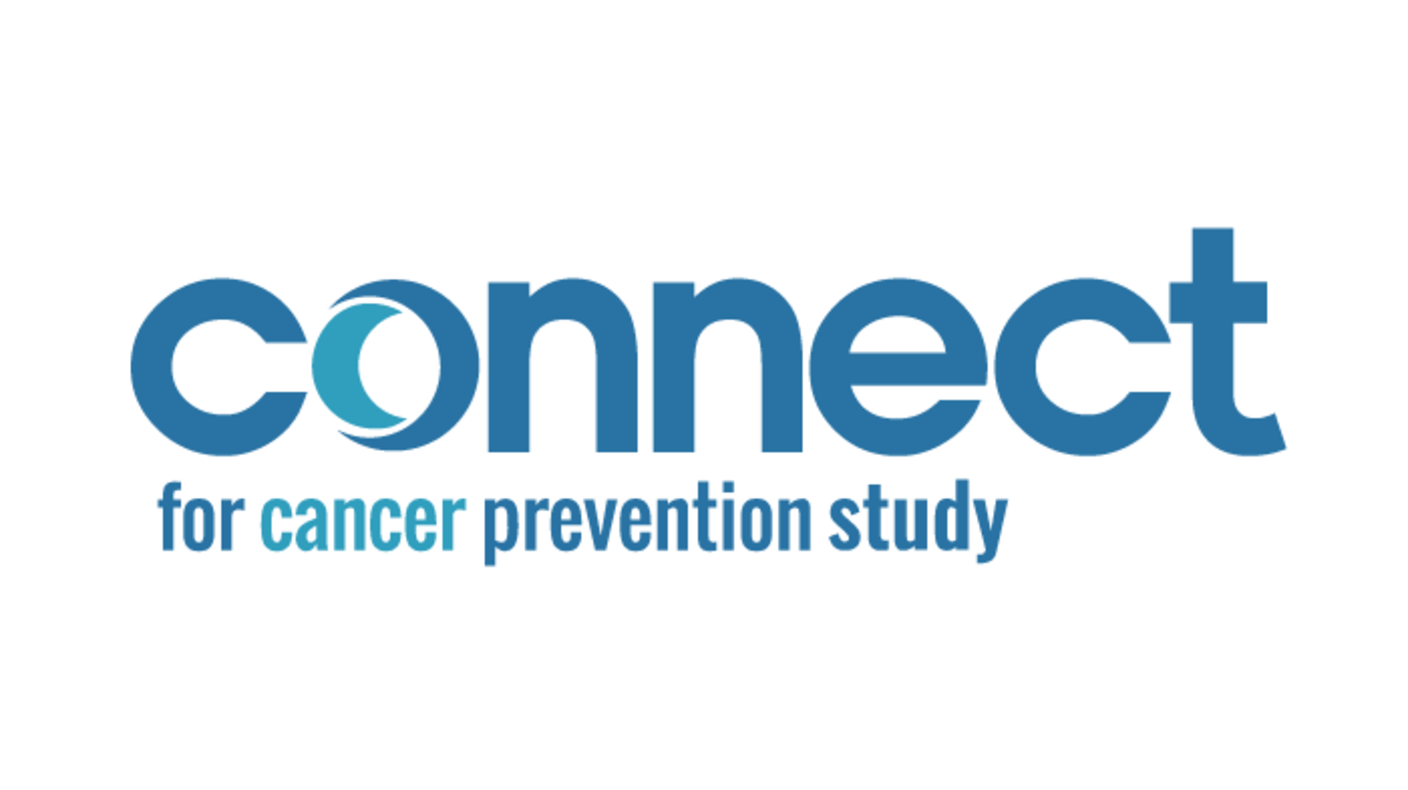Connect Test page
The Connect for Cancer Prevention Study is a prospective cohort seeking to enroll 200,000 adults in the United States designed to further investigate the etiology of cancer and its outcomes, which may inform new approaches in precision prevention and early detection.
Connect capitalizes on research innovations to advance the field of cancer epidemiology and prevention including:
- New technologies for exposure assessment (e.g., tracking and sensors to measure behavior and environment);
- Large-scale analyses of the genome, epigenome, transcriptome, proteome, metabolome, microbiome;
- Molecular profiling of tumors and precursor lesions.
Overview of Study Setting and Design
Infographic describing the Connect StudyThe Connect for Cancer Prevention Study (“Connect”) is being conducted within a set of integrated health care systems to recruit 200,000 members or patients between the ages of 30-70 years with no personal history of invasive cancer (other than non-melanoma skin cancer at the time of recruitment), based on an NIH IRB-approved protocol. Recruitment efforts are aimed to promote participation of individuals from diverse backgrounds and geographic areas.
Connect is led by the National Cancer Institute, in partnership with ten partner health care systems:

What is the Connect for Cancer Prevention Study?
- Health Partners (Minneapolis and St. Paul metro area)
- Henry Ford Health System (Detroit metro area)
- Kaiser Permanente
- Colorado, Denver metro area
- Georgia (Atlanta metro area)
- Hawaii (Kauai, Oahu, Maui, and Hawaii islands)
- Northwest (Salem to Portland, OR and parts of SW WA)
- Marshfield Clinic (north-central WI)
- Sandford Health (Sioux Falls, SD; Fargo, ND; Bismarck, ND; Bemidjj, MN areas)
- University of Chicago (metro area)
- Baylor, Scott and White Health (Dallas, Ft Worth, Waco, Austin, San Antonio, TX)
Consented participants are asked to complete an online questionnaire at baseline and periodically throughout the duration of follow-up, as well as provide access to their electronic medical records (EMRs). Blood, urine, and saliva samples are collected at baseline and repeatedly during follow-up. During follow-up, serial biological specimens as well as new specimens, including tissue specimens, are collected. Passive follow-up via tumor registries and EMRs provides outcome information for cancers and their precursors.
Communication and coordination of study activities occur electronically through a participant application (“app”) available for desktop or mobile devices. This state-of-the-art cohort is built with an efficient, flexible, and integrated infrastructure designed to make the most of modern interoperability standards in order to serve as a research resource for future generations of scientists at the NCI and across the broader scientific community.
Data Infrastructure and Warehousing
Participant and operational study data reside in the Connect for Cancer Prevention Data System (C4CPDS) that is structured to ensure security of the data and appropriate governance. Curated, deidentified versions of the data will be made available to the scientific community (timeline TBD). Connect is expected to provide a rich data resource for innovative cancer prevention research and a myriad of other research applications for future generations.
This state-of-the-art cohort is built with an efficient, flexible, and integrated infrastructure that makes the most of modern interoperability standards and adherence to F.A.I.R. (findability, accessibility, interoperability, and reusability of research resources) principles.
The Connect data infrastructure and data sharing policies are designed to maximize the potential for scientific discovery while ensuring appropriate use of the resource and the NIH data sharing policy. Safeguards for privacy, confidentiality, and appropriate use of study resources are in place to protect participants’ expectations, information, and biospecimens. While the cohort has been designed for innovative cancer prevention research, the rich resource will be available to the broader scientific community following access protocols in the near future.
Timeline
Recruitment through the partnering health care institutions was launched in 2021 and will continue through 2026. Serial questionnaires, biospecimen collection, EHR data collection, data linkages and passive follow-up activities will occur during the duration of the study, which is expected to be for decades. Visit the participant recruitment website.
Study Team
Leadership of the Coordinating Center for the Connect for Cancer Prevention Study
-
Mia Gaudet, Ph.D., Senior Scientist
-
Nicolas Wentzensen, M.D., Ph.D., M.S., Principal Investigator
Resource Sharing Principles for Research
The principles of the Connect for Cancer Prevention Study data and biospecimen sharing policy will support extensive and appropriate use of the resource, consistent with NIH policy. Safeguards for privacy and confidentiality will be in place to protect participants’ data and biospecimens. Any researchers wishing to use the resources from the cohort will need to complete an application. The process will vary for biospecimens and depend on the sensitivity of the requested data.
To improve data traceability and reproducibility of analyses and results according to FAIR (Findable, Accessible, Interoperable, Reusable) data principles, Connect data access will be granted through a cloud-hosted Connect for Cancer Prevention Data Platform. The Data Platform will facilitate access to raw and derived data, metadata, data dictionaries, and annotated code to all platform users.
All projects approved for data and sample use will be noted on the study website, including project summaries and study team descriptions.
For more information, contact Mia Gaudet.
Participant Eligibility Criteria
Eligible participants are members or patients from participating integrated healthcare systems who are between the ages of 30-70 years and have no personal history of invasive cancer (other than non-melanoma skin cancer at the time of recruitment). Recruitment efforts are aimed to promote participation of individuals from diverse backgrounds and geographic areas. Participant recruitment began in the summer of 2021 and is expected to continue through 2028. Participants are recruited by the partner health care systems using site-specific strategies. Consent, user profile information for verification, communication, and coordination of study activities occur electronically through a secure, progressive web application (or “app”) (PWA), called MyConnect.
Participants complete online questionnaires at baseline and periodically throughout the duration of follow-up and provide access to their electronic medical records (EMRs). View baseline and biospecimen survey content.
Blood, urine, and mouthwash samples are collected at baseline and repeatedly throughout follow-up. Along with serial biological specimens, new specimens will be collected during follow-up, such as stool and tissue. Passive follow-up via tumor registries and electronic health records (EHRs) provide outcome information for cancers and their precursors.

